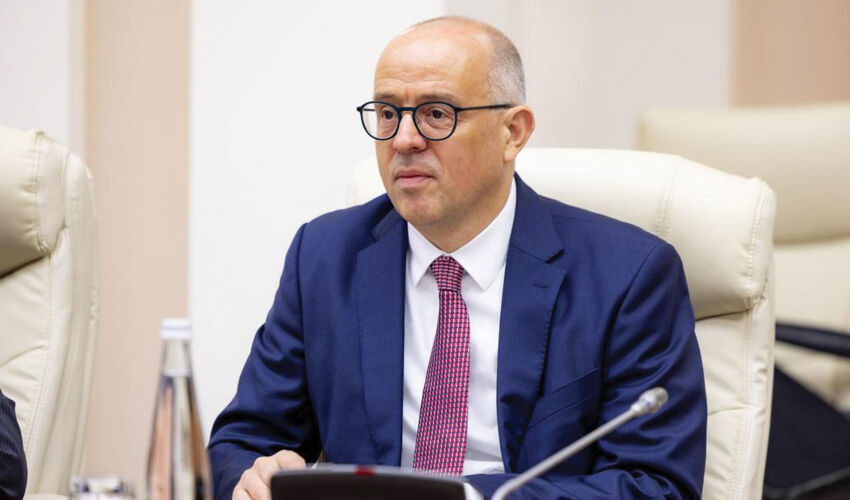
Ulrich Schmitt
World Bank improves outlook
The latest update followed this week from the World Bank Group’s official representative office in Moldova, which, within the framework of the Economic Press Club meeting, updated the report “Moldova economic update”. The bank’s economists revised the country’s economic development forecast, raising the expected GDP growth in 2025 from 0.9% to 1.5%, with some acceleration in the medium term.
Economic growth is expected to accelerate in the medium term, driven by an improved external environment, labor productivity growth, and reforms and investments related to the country’s European integration efforts. Real GDP is projected to grow by 2.7% in 2026 and 3.8% in 2027.
“In the medium term, we forecast an acceleration in economic growth and believe that one of the structural factors contributing to this growth will be labor productivity. We take our cue from the fact that the reforms planned by the authorities will boost productivity and, in the medium term, growth,” said Marcel Chistruga, chief economist at the office.
According to the chief economist, private consumption and investments will remain the main drivers of growth. At the same time, the impact of investment on domestic demand will be much greater. “This factor, of course, will be driven by the level of absorption of EU funds. On the other hand, another factor concerns net exports. In our view, net exports should make a more positive contribution to growth in the medium term. This will be due to the gradual alignment of Moldova’s economy with EU requirements. The increase in productivity will also have a positive impact on export growth”, emphasized Marcel Chistruga.
The hopes of the WB experts to cross-stimulate the business activity of the private sector with substantial capital investments of the public sector are justified. It is expected that public investment will gradually increase and reach about 3% of GDP by 2027.
Ultimately, it will depend on management policies and the ability to absorb the resources available under the Growth Plan and associated Investment Plan to meet critical infrastructure needs. The World Bank’s Regional Director for Moldova, Ulrich Schmitt, said on this occasion that all the prerequisites were in place after the parliamentary elections.
World Bank Regional Director for Moldova Ulrich Schmitt said:
“We are pleased that the elections have resulted in a period of continuity of power, and we look forward to working with the new government on the basis of the reforms outlined,” said the Regional Director, “Moldova is now in a good position. At present, there are political adjustments in the EU enlargement program, on the basis of which the cooperation between the partners will be carried out through the multilateral development assistance mechanism. So in the coming years Moldova will have sufficient resources to carry out reforms”.
At the same time, the WB economists had no questions about the excessive debt burden if the money is spent correctly: “social spending will still be the largest budget item, but is expected to become more focused,” they said.
But “both the budget deficit and public debt will remain above pre-pandemic levels,” so there remains “the need for prudent fiscal management to maintain debt sustainability and adhere to the 2.5% deficit rule (excluding externally financed grants and capital expenditures).
According to the Joint IMF-World Bank Debt Sustainability Analysis 2024, Moldova is at low risk of external debt distress and moderate risk of public sector debt distress.
The WB expects the NBM to maintain a flexible exchange rate regime, stabilizing the national currency if necessary, which will ensure a target range of inflation and prudent external debt management. According to the bank’s experts, “as exports and foreign direct investments strengthen, external financing conditions are projected to improve and Moldova’s current account deficit is expected to decrease, although its level will remain high”.
“The restrictive monetary policy in the first half of the year was later eased. This signals the National Bank’s shift to a more accommodative monetary policy, but at the moment it is still quite prudent, as the risks of inflationary pressures have not disappeared,” Marcel Chistruga added.
Inflation is forecast to continue falling as supply-side pressures ease. Average annual inflation is estimated at 7.8% in 2025 due to energy price pressures. It is expected to return to the target range by the end of 2026 on the back of lower import prices. It will be 5.3% in 2026 and 4.5% in 2027.
The main source of this optimism has been a slight increase in investment activity, although there is still no response to the rate easing. The weighted average interest rate on new loans amounted to 9.4%. Despite this, lending to the economy has intensified.
In addition, additional hopes were brought by the growth of agricultural production in the second half of the year and the stability of disposable income, supported by the reduction of inflationary pressure.
However, “weak export performance, especially to Romania, coupled with sustained growth in imports will continue to weigh on net exports and limit the pace of economic recovery,” the bank’s economists warned.
Scientists are pessimistic
Moldovan economists presented a more pessimistic forecast of annual development results than their colleagues from the World Bank, who also did not distinguish themselves as generous to the country this year.
According to an analysis by researchers at the National Institute of Economic Studies (ASEM), the real growth of the national economy is expected to be 1.2% in 2025, “indicating a very slow recovery due to a decline in agricultural production, stagnant external demand and higher-than-expected inflation”.
According to the scientists, the forecast is influenced by a number of factors, “including internal and external exogenous variables determined by political decisions, the dynamics of the geopolitical situation and the results of partner economies”.
One of the important factors currently determining the dynamics of the Moldovan economy is the consumer price index. The average annual inflation rate for 2025 was revised from 4.0% to 6.5% due to “the persistence of inflationary pressure on food products and services, the increase in tariffs for some public utilities, as well as a slight weakening of the currencies of trading partners against the Moldovan leu”.
Core inflation is expected to remain moderate but “somewhat higher than in the original scenario,” reflecting a slower recovery in domestic supply and modest real wage growth. For Moldova, these changes could directly affect the population’s purchasing power and external competitiveness. Especially after real wage growth was revised downward from +7.9% to +1.3%.
Monitoring price dynamics and balancing monetary policy will be crucial for macroeconomic stability, according to the institute’s economists. Of course, further development of the situation “will be determined by the government’s decisions, especially given the need to accelerate structural reforms”. However, in the current environment, external factors will continue to play a decisive role, according to the authors of the updated study.
IMF supported Moldovan scientists
According to the updated IMF forecast, Moldova’s economy will grow by 1.7% (+1.1%) by the end of 2025. And the impact of external demand both in terms of strengthening the country’s export opportunities and in the pressure on inflation will depend on the global price environment.
The Fund expects a further decline in global inflation, although with differences in different countries. In Moldova, it will be above the target level and will amount to 7.7% in 2025 (taking into account growth risks), while in other countries of the region it will be more restrained.
Global growth is projected to slow from 3.3% in 2024 to 3.2% in 2025 and 3.1% in 2026. At the same time, advanced economies will grow at around 1.5%, while emerging market and developing economies will grow at just above 4%.
IMF chief economist Pierre-Olivier Gourinchas told a briefing that an escalating trade war between the US and China could negatively affect the global economic growth outlook. He said recent statements by officials from both countries make it “realize that trade uncertainty still persists.”
Policymakers are urged to “rebuild trust through credible, transparent and sustainable policies.” Trade diplomacy must be combined with macroeconomic adjustment. “Domestic reserves should be methodically rebuilt, central bank independence should be preserved, and structural reform efforts should be redoubled,” the fund’s economists recommend in the October issue of the World Economic Outlook.



